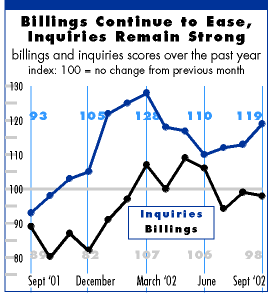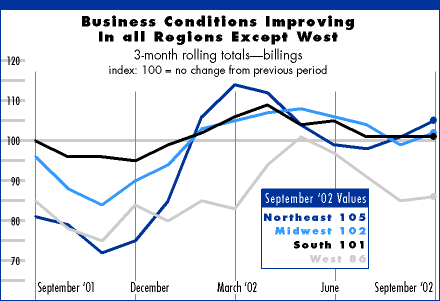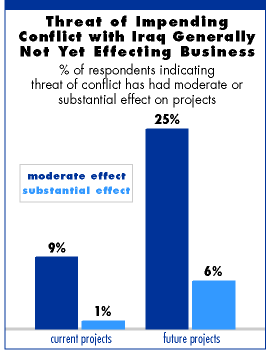
Although impending threat of potential Iraqi conflict adds to overall economic uncertainty, few firms report substantial impact

Work-on-the-Boards Survey
by Kermit Baker, PhD, Hon. AIA
AIA Chief Economist
U.S. architecture firms report that business conditions remained sluggish in September. Billings declined modestly last month, bringing to three the number of continuous months with slight declines in billings at firms. Inquiries for new projects continued to pick up at a brisk pace, although several firms reported that clients are taking longer than usual to begin new projects.
 Conditions
across construction sectors are beginning to shift. Firms that concentrate
in the commercial/industrial sector reported strong billings and inquiries
in September, while firms that concentrate in the institutional sectors
report weak billings. Over the past 12 to 18 months, institutional firms
have generally reported strong conditions, while commercial and industrial
firms have reported softness in their markets. Residential firms continue
to report favorable conditions for both billings and inquiries.
Conditions
across construction sectors are beginning to shift. Firms that concentrate
in the commercial/industrial sector reported strong billings and inquiries
in September, while firms that concentrate in the institutional sectors
report weak billings. Over the past 12 to 18 months, institutional firms
have generally reported strong conditions, while commercial and industrial
firms have reported softness in their markets. Residential firms continue
to report favorable conditions for both billings and inquiries.
Regionally, business conditions remain largely unchanged, with stable conditions to slight improvements for firms in the Northeast, Midwest, and South, and continued easing for firms in the West.
Continuing overall slowdown
The overall economic slowdown that began earlier this summer continues.
After four straight months of modest increases in payrolls, businesses
reported a small decline in September. However, in a separate survey of
households, a smaller share of workers reported being unemployed than
in September.
In spite of lower levels of unemployment, consumers are feeling less comfortable with economic conditions. Consumer sentiment took a sharp drop in early October according to the University of Michigan's Consumer Sentiment index, following on the heels of more modest declines each month for the prior three months. Business executives are just as concerned as households according to the third quarter results of the CEO Business Confidence Survey, which saw its index drop to 54 in the third quarter from 61 in the second quarter.
Leading economic indicators don't point to better news on the horizon. The ECRI leading index of economic indicators declined in September, bringing the number of consecutive monthly declines to three. These drops have wiped out all of the gains that this leading index was able to build since the end of last year.

Little consequence
to date of Iraqi conflict threat
Some firms indicate that the threat of an impending conflict with Iraq
is slowing progress on projects. The impact on current projects is minimal;
9 in 10 firms report that they are not seeing any effect on current projects,
and most of the rest are seeing only moderate effects.
 For
future projects, the threat of conflict is of more consequence. A quarter
of firms report a moderate effect on the scope or timetable of future
projects, and an additional 6% report a substantial effect. Firms of all
sizes, location, and specialization are feeling the impact of potential
military action about equally on future projects. Many firms note it is
difficult to disentangle the contribution of an economic slowdown, stock
market concerns, and international political fears. The overall result,
however, is that many projects are proceeding more slowly than respondents
would expect.
For
future projects, the threat of conflict is of more consequence. A quarter
of firms report a moderate effect on the scope or timetable of future
projects, and an additional 6% report a substantial effect. Firms of all
sizes, location, and specialization are feeling the impact of potential
military action about equally on future projects. Many firms note it is
difficult to disentangle the contribution of an economic slowdown, stock
market concerns, and international political fears. The overall result,
however, is that many projects are proceeding more slowly than respondents
would expect.
Copyright 2002 The American Institute of Architects. All rights reserved.
![]()
|
This month, Work-on-the-Boards-survey participants are saying: The residential market is still extremely strong, especially multifamily
in urban locations. In the retail sector, we are finding smaller inquiries and projects
are beginning to increase. On the coattails of these projects, we
anticipate larger projects to follow. The amount of new work out there has declined significantly. Firms
who previously concentrated on private-sector business are now entering
our public-sector markets and competing successfully. In a nutshell:
less work, more competition. Too much client uncertainty! |
|